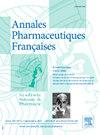État des lieux des pratiques concernant la remise d’une carte de traçabilité suite à l’implantation d’un dispositif médical
IF 1.1
Q4 PHARMACOLOGY & PHARMACY
引用次数: 0
Abstract
Objectifs
Le nouveau règlement européen 2017/745 impose la remise d’une carte d’implant au patient suite à la pose de dispositifs médicaux implantables (DMI). Actuellement, aucune procédure ne décrit le processus de remise de documents de traçabilité aux patients dans notre établissement. L’objectif de ce travail était d’évaluer les pratiques des différents services concernés dans notre établissement et de réfléchir aux actions à mettre en place pour satisfaire la réglementation.
Matériel et méthodes
L’évaluation des pratiques concernant la remise de documents de traçabilité aux patients était évaluée grâce à un questionnaire auprès de 13 services. Puis, pour chaque spécialité, trois dossiers patients informatisés étaient audités. Enfin, les fournisseurs de DMI étaient interrogés sur leur capacité à fournir des cartes d’implant.
Résultats
Au total, 85 % (11/13) des services transmettaient un document de traçabilité de DMI aux patients, et dans 91 % (10/11) des cas, cette transmission se faisait via à la carte d’implant ou le compte rendu opératoire (CRO). Cependant, 63 % des CRO analysés ne contenaient pas les données de traçabilité des DMI implantés. Enfin, seulement 60 % des fournisseurs interrogés accompagnaient leurs DMI d’une carte d’implant.
Conclusion
En attendant que les fournisseurs transmettent une carte d’implant, il a été proposé aux services de remettre aux patients la fiche de traçabilité des DMI issue du logiciel de traçabilité des DMI. Cependant, ce document ne nous permet pas d’être en totale conformité avec le règlement européen du fait de l’absence d’informations réglementaires (IUD, adresse et site internet du fabricant).
Introduction
The European regulation 2017/745 requires the delivery of an international implant card to the patient following the implantation of implantable medical devices (IMD). Currently, there are no procedure to describe the process for providing traceability documents to patients in our institution. The objective of this work was to evaluate the practices of the various departments concerned in our institution and to think about actions to meet the current regulation.
Material and method
The evaluation of practices concerning the delivery of traceability documents to patients was evaluated through a questionnaire with 13 departments. Then, for each specialty, three electronic patient record (EPR) were audited. Finally, IMD's suppliers were asked about their ability to provide an international implant card.
Results
In total, 85% (11/13) of the departments sent an IMD traceability document to patients, and in 91% (10/11) of cases, this transmission was done with the international implant card or the operative report. However, 63% of the operative report analyzed did not contain the traceability data of the IMD. Finally, only 60% of the suppliers contacts accompanied their IMD with an international implant card.
Conclusion
While waiting for the suppliers to send an international implant card, it was proposed to the departments to give patients the IMD traceability sheet from the IMD traceability software. However, this document does not allow us to be in full compliance with the European regulation to the absence of regulatory information (UDI, address and manufacturer's website).
[审查有关在植入医疗装置后发放国际植入卡的做法。]
导言:欧洲第 2017/745 号法规要求在植入可植入医疗器械(IMD)后向患者提供国际植入卡。目前,我院尚无向患者提供可追溯性文件的程序说明。这项工作的目的是对本机构各相关部门的做法进行评估,并思考如何采取行动来满足现行法规的要求:通过对 13 个部门进行问卷调查,对向患者提供可追溯文件的做法进行评估。然后,对每个科室的三份电子病历(EPR)进行了审核。最后,还询问了 IMD 供应商提供国际植入卡的能力:85%(11/13)的科室向患者发送了 IMD 追踪文件,其中 91%(10/11)的病例是通过国际植入卡或手术报告进行传输的。然而,在分析的手术报告中,有 63% 没有包含 IMD 的追踪数据。最后,只有 60% 的供应商在联系 IMD 时附上了国际植入卡:结论:在等待供应商寄送国际植入卡的同时,我们建议科室向患者提供 IMD 追踪软件中的 IMD 追踪表。然而,由于缺少监管信息(UDI)、地址和制造商网站,这份文件并不能让我们完全遵守欧洲法规。)
本文章由计算机程序翻译,如有差异,请以英文原文为准。
求助全文
约1分钟内获得全文
求助全文
来源期刊

Annales pharmaceutiques francaises
PHARMACOLOGY & PHARMACY-
CiteScore
1.70
自引率
7.70%
发文量
98
期刊介绍:
This journal proposes a scientific information validated and indexed to be informed about the last research works in all the domains interesting the pharmacy. The original works, general reviews, the focusing, the brief notes, subjected by the best academics and the professionals, propose a synthetic approach of the last progress accomplished in the concerned sectors. The thematic Sessions and the – life of the Academy – resume the communications which, presented in front of the national Academy of pharmacy, are in the heart of the current events.
 求助内容:
求助内容: 应助结果提醒方式:
应助结果提醒方式:


